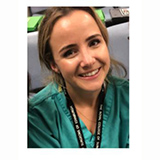Many of us will be familiar with common medical speciality stereotypes—“the tall, strong orthopaedic surgeon from the medics rugby team,” the psychiatrist who is “as mad as their patients,” or the “bike-obsessed-coffee-drinking anaesthetist.” But why and how do these stereotypes exist? Are they just good fun or could we be putting-off medical students from enjoying a fulfilling, exciting career? Are they preventing us from creating diversity within our specialities by labouring under these historic, often inaccurate, pretences?
On Episode 40 of Sharp Scratch, our BMJ Student podcast, we (Clara Munro, editorial registrar and Nikki Nabavi, editorial scholar) were joined by two of our junior doctor panellists, Chidera Ota and Declan Murphy, to discuss the veracity and origin of these stereotypes and debunk the myths surrounding specialities with the aim to encourage medical students to remain open-minded when considering future careers. This is not a novel topic, with substantial discussion on the accuracy of speciality stereotypes in the literature. [1–3] For example, the popular 2011 Christmas paper in The BMJ, “Orthopaedic surgeons: as strong as an ox and almost twice as clever?” disproved the stereotype of orthopaedic surgeons as “strong but stupid” showing that they were not only stronger than their anaesthetic colleagues, but that they also scored consistently higher in an IQ test. [4] Our purpose was to challenge the preconceptions of specialities that medical students may have been exposed to as part of the hidden curriculum, through corridor conversations and comments from staff on their placements.
It is worth recognising that the urge to categorise is very typical for doctors and medical students, as we use pattern recognition and cognitive shortcutting to make rapid diagnosis and treatment decisions on a daily basis. [5] Categorisation creates an illusion of order which shields us from the great number of unknowns that our profession yields. The use of (often dark) humour is also common within medicine, and is employed by many doctors as a way of psychologically processing traumatic or difficult events and to create cohesive teams through the shared experience of comedy. Both of these tools, if used in the right way and at the right time can be beneficial to doctors and teams, but equally run the risk of alienating other groups if done insensitively. Dividing colleagues into neatly wrapped packages—surgeons: “angry and knife wielding”, paediatricians: “friendly and bubble blowing,” radiologists: “stored in a cool dark place”, might act to protect us from our own insecurities and often be amusing when there is truth in the taunt; but can be harmful to the multidisciplinary nature of our work.
There is somewhat of a chicken and egg argument when looking to see where these myths come from. Undoubtedly, some personalities are drawn to some specialities because of the skills set required. One argument is that personality groupings are perpetuated within specialities as we gravitate to those that are “like us” and these sides of our personality come out more strongly. Belonging is well recognised as one of the strongest drivers for most of us within a team so there is a tendency to heighten certain pre-existing elements of your personality to fit-in within your team. Chidera Ota mentions this on the podcast, citing her experience of being a problem solver, and how she often “likes to find the problem and remove it as quickly as possible”, which is a part of her personality she feels has developed even stronger since being on her neurosurgical job. Chidera recognised that in other aspects of her life, such as moving house, “people have commented that [she is] very solution oriented”, as she described her action plan to cope with any obstacles she faces in her day-to-day life, much like how you might imagine a stereotypical surgeon would.
This bodes well for those whose physical characteristics and personality match with the generally agreed perception of that speciality, but many will find themselves interested in a specialty where they might not fit the typical characteristics. We discussed this in the episode, questioning whether these individuals will succeed within such specialties. Declan Murphy, who expressed an interest in pursuing a career in plastic surgery, described how he did not feel he “conforms with a stereotypical plastic surgeon,” who he described as famously “beautifully attractive and financially driven.” Throughout the episode, we noticed that our perception of a typical surgeon is often an individual with a private school education, suggesting that these stereotypes aren’t limited to gender and race, but also socio-economic background. Clara shared her own frustrations that it can often be an uphill battle to be accepted as who you say you are, when even patients expect you to look and behave differently. All too often, even after introducing herself numerous times and performing surgery, it is common for the patient to complain to Clara that they “still haven’t seen a surgeon.” This is where role modelling is so important. While witnessing the bad-mouthing of specialities has been shown to prevent medical students from choosing certain careers conversely, having good role models—including those who advocate for you as well as look or behave like you, plays the greatest role in speciality choice. [6-8]
There is a great deal of humour to be found within speciality stereotypes in medicine. If you haven’t seen the twitter feed of current prominent UK politicians as NHS consultants it is the tonic we all need right now—with a favourite being Nicola Sturgeon as “the colorectal surgeon who is the most capable pair of hands.” [9] But we must also consider the rhetoric we use when discussing other specialities around those who haven’t made a firm choice about their future careers. By encouraging good role models, avoiding a “them and us” mentality, and viewing these stereotypes “like horoscopes—with a healthy degree of scepticism and disbelief” we can create the diverse, representative and fulfilled teams that the NHS deserves. [3]
Clara Munro, Editorial registrar and clinical fellow, The BMJ, and general surgical trainee, North East England.
Nikki Nabavi, Editorial scholar, The BMJ, and medical student, University of Manchester.
References:
1.Oxtoby K. Do the classic specialty stereotypes still hold true for today’s doctors? BMJ [Internet]. 2013 Dec 17 [cited 2020 Nov 2];347:f7454. Available from: https://www.bmj.com/content/347/bmj.f7454
2. Did you choose them, or did they choose you? | Postgraduate Medical Journal blog [Internet]. [cited 2020 Nov 2]. Available from: https://blogs.bmj.com/pmj/2016/02/24/did-you-choose-them-or-did-they-choose-you/
3. Tagg A. On labels. Don’t Forget The Bubbles [Internet]. 2018 Jan 2 [cited 2020 Nov 2]; Available from: ://dontforgetthebubbles.com//on-labels/
4. Subramanian P, Kantharuban S, Subramanian V, Willis-Owen SAG, Willis-Owen CA. Orthopaedic surgeons: As strong as an ox and almost twice as clever? Multicentre prospective comparative study. BMJ (Online) [Internet]. 2011 Dec 24 [cited 2020 Nov 2];343(7837). Available from: http://www.icmje.org/coi_disclosure.pdf
5. Adams E, Goyder C, Heneghan C, Brand L, Ajjawi R. Clinical reasoning of junior doctors in emergency medicine: A grounded theory study. Emergency Medicine Journal [Internet]. 2017 Feb 1 [cited 2020 Nov 2];34(2):70–5. Available from: https://emj.bmj.com/content/34/2/70
6. Hunt DD, Scott C, Zhong S, Goldstein E. Frequency and effect of negative comments (“Badmouthing”) on medical students’ career choices. Academic Medicine. 1996;71(6):665–9.
7. Stahn B, Harendza S. Vorbilder spielen die größte Rolle – Eine qualitative studie zu gründen für die wahl der ärztlichen weiterbildung an einem universitätsklinikum. GMS Zeitschrift fur Medizinische Ausbildung [Internet]. 2014 [cited 2020 Nov 2];31(4):1–15. Available from: /pmc/articles/PMC4259064/?report=abstract
8. Yoon JD, Ham SA, Reddy ST, Curlin FA. Role Models’ Influence on Specialty Choice for Residency Training: A National Longitudinal Study. Journal of graduate medical education [Internet]. 2018 Apr 1 [cited 2020 Nov 2];10(2):149–54. Available from: /pmc/articles/PMC5901792/?report=abstract
9. Zack on Twitter: “Nicola Sturgeon – Colorectal Surgeon. Most capable pair of hands in the department. Generally bemused by the gross incompetence of almost everyone around her. Considers M&Ms sport. Once glared at a condescending registrar so hard he passed out in theatre. https://t.co/3L8zJCsykx” / Twitter [Internet]. [cited 2020 Nov 2]. Available from: https://twitter.com/zackferguson/status/1195071795684167680?lang=en
| The Sharp Scratch Panel:
Nikki Nabavi, The BMJ, University of Manchester Chidera Ota, Junior clinical fellow in neurosurgery at Charing Cross Hospital, London Declan Murphy, Academic foundation year 2 doctor at Northumbria Specialist Emergency Care Hospital, Newcastle Specialty stereotypes episode guests: Clara Munro, Editorial registrar and clinical fellow, The BMJ, and general surgical trainee, North East England. Listen to the episode on Spotify and Apple pods. Follow us on Twitter: Panel: @nikkixnabavi @chidera_ota @1994_declan Guest: @ClaraEMunro Brought to you by: @bmj_latest, @BMJStudent Sponsored by: @MPS_Medical Instagram: @BMJ_Student |


